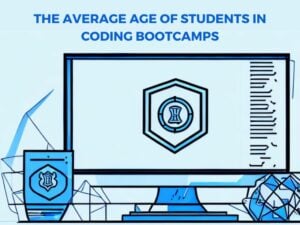As the demand for tech professionals grows, coding bootcamps have emerged as a popular alternative to traditional computer science degrees.
However, many people question whether bootcamp graduates are truly qualified for tech jobs and whether companies are willing to hire them.
In this article, we will explore the rise of coding bootcamps, the skills bootcamp graduates bring to the table, hiring trends among top tech companies, and how bootcamp graduates compare to their counterparts with computer science degrees.
The growth of bootcamp programs
Bootcamps have grown rapidly over the past decade, with many new programs launching yearly.
In 2013, there were just 43 bootcamps in the United States. By 2018, that number had skyrocketed to 108.
According to the Course Report, a website that tracks the bootcamp industry, there were over 20,000 bootcamp graduates in 2019, up from just over 15,000 in 2018.
One reason for the growth of bootcamp programs is the demand for tech talent.
As the tech industry has grown, so has the need for skilled workers who can develop and maintain software, build websites, and manage databases.
Coding bootcamps offer a way for people to quickly gain the skills they need to enter this rapidly growing field.
Hiring trends among top tech companies
Many top tech companies are actively hiring bootcamp graduates, recognizing the value of their skills and experience. As a result, more than 70% of bootcamp graduates find employment in 180 days.
Here are some examples of companies that have hired bootcamp graduates:
Companies that actively hire bootcamp graduates
- IBM
- Apple
- Amazon
- Microsoft
- Uber
- Spotify
- Slack
- GitHub
Success stories of bootcamp graduates in the industry
Many bootcamp graduates have gone on to successful careers in the tech industry, proving that bootcamps can be a valuable way to launch a career in tech.
For example, after completing the program, Josh Kemp, a graduate of General Assembly’s web development bootcamp, landed a job at Google.
Similarly, Alex Miller, a graduate of the Flatiron School, now works as a software engineer at Twitter.
These success stories demonstrate that bootcamps can provide a valuable path to a career in tech.
The role of bootcamp networks and partnerships
Bootcamps often partner with companies and organizations to help students connect with potential employers.
For example, General Assembly partners with hundreds of companies, including Google, IBM, and Microsoft.
Similarly, Flatiron School partners with companies like Etsy, Bloomberg, and Kickstarter.
These partnerships provide bootcamp graduates with valuable opportunities to network, learn about job opportunities, and get their foot in the door at top tech companies.
Comparing bootcamp graduates to traditional computer science degree holders
One common question is how bootcamp graduates compare to their counterparts with computer science degrees.
Here are a few key differences:
Differences in education and training
Bootcamp programs typically focus on practical skills, while computer science degrees often provide a more theoretical foundation in computer science concepts.
Computer science degrees also typically take longer and may be more expensive.
However, computer science degree holders may be better prepared for more technical roles or pursuing higher-level tech careers.
Pros and cons of hiring bootcamp graduates
There are pros and cons to hiring bootcamp graduates.
On the one hand, bootcamp graduates often have hands-on experience and practical skills to apply to the job from day one.
They are also often highly motivated and eager to learn.
On the other hand, they may lack the same level of theoretical knowledge or deeper understanding of computer science concepts that someone with a computer science degree may have.
How companies evaluate candidates from different educational backgrounds
Ultimately, companies evaluate candidates based on various factors beyond their educational background.
The skills and experience that a candidate brings to the table and their fit with the company culture and team dynamics are also critical considerations.
Companies may place different weights on different educational backgrounds depending on the specific needs of the role.
The skills bootcamp graduates bring to the table
Despite the rapid growth of coding bootcamps, many people wonder whether bootcamp graduates are truly qualified for tech jobs.
However, companies have recognized the value of these programs and are increasingly willing to hire bootcamp graduates.
Here are some of the skills that bootcamp graduates bring to the table:
Technical skills and programming languages
First and foremost, bootcamp graduates have hands-on experience in programming languages like JavaScript, Python, and Ruby.
They also have experience with other technical skills like database design, web development, and software engineering.
While bootcamps may not provide the same level of depth as a traditional computer science degree, they can still help graduates develop practical skills to apply in the workforce.
Bootcamps often provide students access to the latest tools and technologies used in the industry.
This means that graduates are familiar with the latest trends and can hit the ground running when they start their new jobs.
Additionally, bootcamps often have partnerships with tech companies, providing students with opportunities to work on real-world projects and gain experience working in a professional environment.
Problem-solving and critical thinking
Bootcamps often emphasize problem-solving and critical thinking, which are critical skills in the tech industry.
Graduates learn how to break down complex problems, think creatively, and develop solutions using code. These skills can be applied to a wide range of tech jobs, making bootcamp graduates attractive candidates for companies looking for problem-solvers.
Bootcamps also teach students to approach problems from different angles and think outside the box.
This can be particularly valuable in a fast-paced industry like tech, where innovation is key. By thinking creatively and coming up with unique solutions, bootcamp graduates can help companies stay ahead of the competition.
Collaboration and teamwork
Many bootcamps emphasize collaboration and teamwork, essential skills in the tech industry.
Graduates learn how to work on projects with others, communicate effectively, and share their knowledge with their peers. These skills can be particularly valuable for companies that value workplace collaboration and teamwork.
Bootcamps often simulate a real-world work environment, where students work in teams to complete projects.
This gives graduates experience working with others and the ability to navigate different personalities and working styles.
Additionally, bootcamps often have alumni networks that allow graduates to connect with others in the industry and expand their professional network.
Adaptability and continuous learning
Bootcamps prepare students for the constantly changing landscape of the tech industry.
Graduates learn how to adapt to new technologies and programming languages and the importance of continuous learning. These skills can make bootcamp graduates particularly well-suited for roles that require flexibility and an ability to learn quickly.
Bootcamps often emphasize the importance of staying up-to-date with the latest technologies and trends.
Graduates are encouraged to continue learning even after they complete the program, whether through online courses, conferences, or other professional development opportunities.
This dedication to continuous learning can help bootcamp graduates stay ahead of the curve and be valuable assets to their employers.
Bootcamp graduates bring a unique set of skills and experiences to the table.
While they may not have the same level of formal education as traditional computer science graduates, they have practical skills and real-world experience that can make them valuable members of any tech team.
Conclusion
Coding bootcamps have emerged as a popular alternative to traditional computer science degrees, and bootcamp graduates are increasingly sought after by top tech companies.
While there may be differences between bootcamp graduates and their counterparts with computer science degrees, both can bring valuable skills and experiences to the job.
Ultimately, the key to landing a job in the tech industry is to build practical skills, stay up-to-date with the latest technologies, and seek out opportunities to connect with potential employers.





